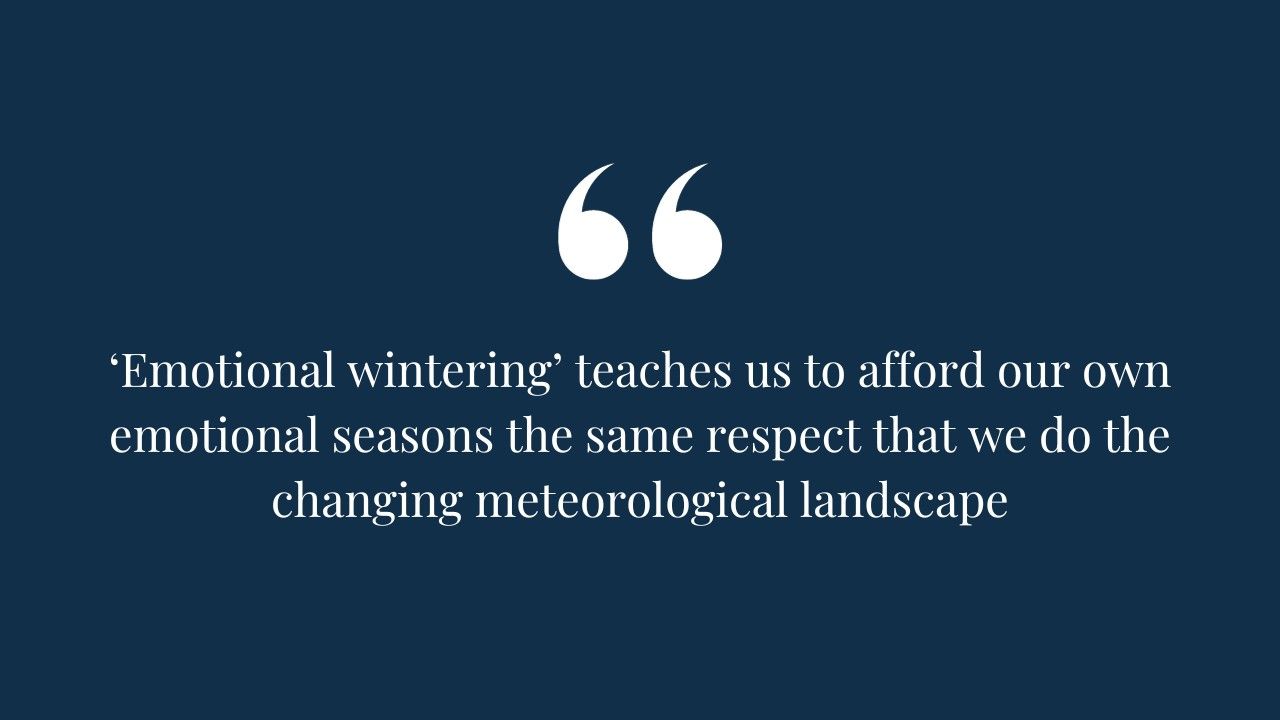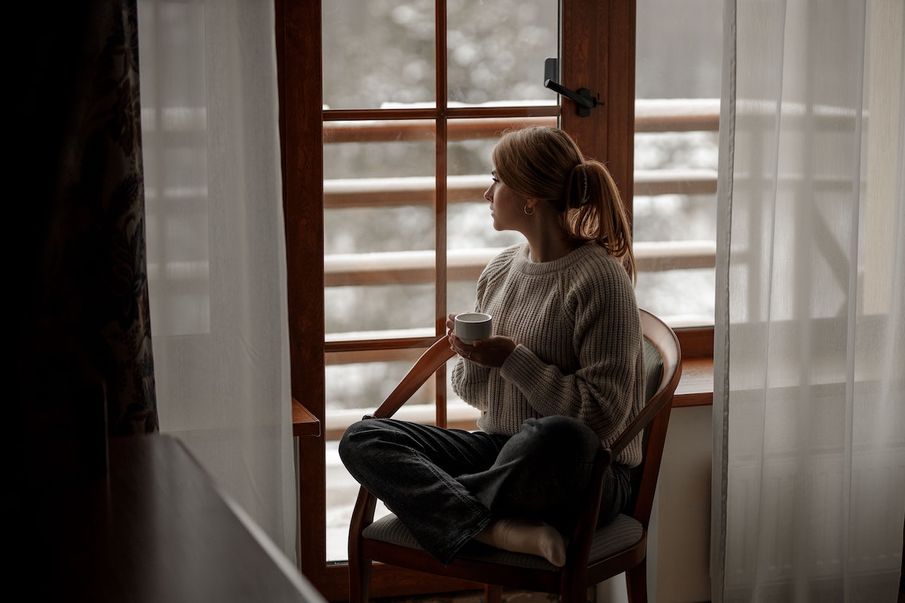Our feelings change like the seasons, so treat them in the same way… Hunker down when the chill wind blows, and prepare yourself for the coming spring
When the seasons change, we know that we have to change our behaviour to keep ourselves safe and warm. As the long summer evenings are ushered away by blustery, autumnal afternoons, we know that winter is on its way. There are clues to the changing seasons all around us as lush, verdant greens are replaced with golds and ambers.
As the trees shed their leaves and frosts creep in, we prepare our homes and ourselves for the winter months. Soup season beckons; thick socks, heavy knits, and cosy blankets are brought out, and swimwear lies forgotten in a drawer. Beer gardens are replaced by log fires, salads with roasts, and beach days with bonfires.
We are so used to the changing seasons that we learn to look forward to different elements in all of them.
‘Emotional wintering’ teaches us to afford our own emotional seasons the same respect that we do the changing meteorological landscape. It asks us to see our difficult or uncomfortable feelings as winters which we can prepare for, live through, and emerge from, ready for the spring which will be there to meet us on the other side.
Were we to expect to always live in our emotional summers, laughing, joyful, and upbeat all the time, no matter what was happening around us, we would find our other seasons more difficult to endure.
When we allow ourselves to fully experience our difficult feelings, we can see the purposes they serve, and grow from challenging experiences. Emotional wintering encourages us to prepare ourselves to face difficult times and uncomfortable feelings, in a similar way to how we prepare to get through the cold months of winter.
There is no point in pretending the seasons will not change as we are surrounded by evidence of their shifts. We also know that each season is necessary. Autumn and winter allow for rest, time to recuperate, and take stock. Naked trees which look dead are far from it. They are building up their reserves, but not wasting their precious, limited energy on producing new growth, which would be damaged by icy frost, ferocious winds, or torrential downpours.

Emotional wintering asks us to change our habits, expectations of ourselves, and nourish ourselves appropriately, to get through difficult times. This process gives us the space to explore the full range of emotions that makes us human, and allows us to safely sit with a feeling, in relative comfort, until it passes.
The phrase ‘emotional wintering’ was popularised by Katharine May in her celebrated 2020 work Wintering. In this gently powerful memoir, Katharine examines some of the ancient processes humans have embraced and undergone during trying times or turbulent periods. She explores the importance of allowing ourselves time to “retreat, to care for and repair ourselves” during what she calls “the fallow periods of life”, reviews how different cultures deal with these spells, and looks for ways we can use them to improve our own emotional winters.
Sometimes our emotional winters are triggered by an event; something happens to us that makes us feel as though we want to withdraw into ourselves. At other times we can simply exhaust our supplies of positivity, and need to take time to replenish them while accepting that we are sad.
Whatever the cause of a specific challenging time, emotional wintering encourages us to allow this space for recuperation. It is an acceptance that our emotional seasons are cyclical and normal; it encourages us to accept all of our feelings and manage them as best we can, rather than trying to resist or control them.
Difficult emotions come to all of us; we will all be sad, angry, and sometimes feel hopeless. When we try to control our emotions, we can prolong these challenging spells. We can’t control the actions of others or the world around us, and we can’t control our own emotional responses to things that happen. But we can prepare for them by giving ourselves space to process, feel, and evolve from emotionally difficult times. We can allow uncomfortable feelings to run their course in a manageable way, by altering our expectations of ourselves for a little while.
We can cope better with periods of sadness and unhappiness by reducing expectations of ourselves. While some tasks are essential, like going to work in order to pay the bills, there are lots of ways in which we can reduce the other burdens we put on ourselves.
Firstly, we need to take time to listen to our bodies: when you are tired, sleep; if you are weary, rest; when you are hungry, eat.
Rejecting social engagements is a powerful way of advocating for ourselves while we are feeling low. Any event which makes us feel as though we need to pretend to be happy when we are not, can be incredibly draining; when our reserves are in short supply, it’s important to keep them for where they’re needed most. If there is a celebration that you feel obligated to attend, think about offering an alternative – meeting trusted friends for a walk, or a daytime chat, is less pressured and can be mentally beneficial.

Choosing to move away from social media in favour of time outside is also helpful. While wintering, we are not looking to actively boost our mood, but rather allowing time for challenging feelings to pass. However, it is important to not engage in activities which make us actively feel worse, and social media can be a particular problem here. Encouraging either feelings of inadequacy brought about by comparison, or the toxically positive message that we should always be presenting a cheerful image, regardless of how we feel, are at complete odds with wintering, and will serve to prolong tricky feelings.
Asking for help is important. If somebody else can help with family commitments – cooking an evening meal or picking up some shopping – please let them. The more space we have away from the mental load of day-to-day life, the easier it will be for our minds to recover from the challenges they’re facing. Nothing bad will happen if the vacuuming or dusting isn’t done for a few days.
Lower your expectations of yourself. Just because you would normally be able to manage an extra commitment at work or school doesn’t mean you should at this time. Step back from anything which puts unnecessary pressure on you, and focus on rest instead.
If you are in a position to be able to take a break from your usual surroundings, this can be really helpful. A short break away from home can help your brain and body to accept that expectations are different, and encourages you to rest and recharge.
If your sadness is affecting you physically, or you feel unable to cope, please seek medical advice from your GP.
Despite the images social media bombards us with suggesting otherwise, it would not be normal to feel wonderful all the time. Our emotions change like the seasons, and, like the changing seasons, we need to change our expectations of ourselves and behaviours, to make sure we are well by the time the next summer rolls around.


Comments